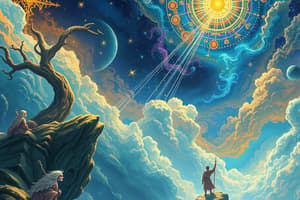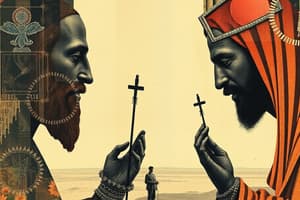Podcast
Questions and Answers
What is Buddhism?
What is Buddhism?
- A religion based on the life of Jesus
- A philosophy from ancient Greece
- A form of government
- A belief system focused on enlightenment and overcoming suffering (correct)
What is the time period of the Classical Era?
What is the time period of the Classical Era?
600 BCE - 600 CE
What is Judaism?
What is Judaism?
A religion that originated in the Middle East, founded by Moses.
What is Christianity based on?
What is Christianity based on?
What is Hinduism?
What is Hinduism?
What does Confucianism emphasize?
What does Confucianism emphasize?
What is Daoism (Taoism)?
What is Daoism (Taoism)?
What is Zoroastrianism?
What is Zoroastrianism?
What is the Torah?
What is the Torah?
What are synagogues?
What are synagogues?
Who is Siddhartha Gautama?
Who is Siddhartha Gautama?
What are the Vedas?
What are the Vedas?
What is reincarnation?
What is reincarnation?
What is Nirvana?
What is Nirvana?
What is the Pax Romana?
What is the Pax Romana?
What is the Law of Twelve Tables?
What is the Law of Twelve Tables?
What were the Punic Wars?
What were the Punic Wars?
Who was Constantine?
Who was Constantine?
What is the Diaspora?
What is the Diaspora?
What does Karma mean?
What does Karma mean?
What is the Eightfold Path?
What is the Eightfold Path?
What is the Mahabharata?
What is the Mahabharata?
What is Dharma?
What is Dharma?
Who is Shiva?
Who is Shiva?
What is the Ramayana?
What is the Ramayana?
Who is Vishnu?
Who is Vishnu?
Who is Paul in Christianity?
Who is Paul in Christianity?
What is the Great Wall of China?
What is the Great Wall of China?
Who are Brahmins?
Who are Brahmins?
Who are Kshatriyas?
Who are Kshatriyas?
Who are Vaishyas?
Who are Vaishyas?
Who are Shudras?
Who are Shudras?
What is the Vedic Age?
What is the Vedic Age?
What is the Mauryan Empire?
What is the Mauryan Empire?
Study Notes
Key Belief Systems and Religions
- Buddhism: Originated in India around 500s BCE; emphasizes overcoming desires to achieve happiness and enlightenment through spiritual practices.
- Judaism: Founded by Moses in the Middle East, emphasizes monotheism and the covenant with one God; depicted by David's Star.
- Christianity: Based on the life and teachings of Jesus, it emphasizes love, redemption, and faith.
- Hinduism: Predominant religion in India, intertwining spiritual beliefs with daily life and social structures, notably the caste system.
- Confucianism: Focuses on education, familial respect, peace, and justice, shaping social norms and governance.
- Daoism: Philosophical system founded by Laozi which espouses living in harmony with the Dao, a universal principle guiding life.
- Zoroastrianism: Ancient Iranian religion focusing on Ahura Mazda as the singular deity and the dichotomy of good versus evil actions.
Historical Periods and Events
- Classical Era (600 BCE - 600 CE): A significant period marked by the rise of major civilizations and global religions.
- Pax Romana: A period of relative peace established across the Roman Empire, promoting stability and prosperity.
- Punic Wars: Three major conflicts between Rome and Carthage from 264 BC to 146 BC, noted as some of the largest wars of the time.
Key Texts and Symbols
- Torah: The sacred text of Judaism, containing foundational laws and teachings.
- Vedas: Ancient Hindu scriptures consisting of hymns and rituals central to Aryan spirituality.
- Mahabharata: The longest epic poem in the world, encompassing key Hindu beliefs and morals.
- Ramayana: A significant poem illustrating the virtues of fulfilling one's dharma.
Concepts in Hinduism and Buddhism
- Reincarnation: The belief in the rebirth of the soul after physical death, a core tenet in Hinduism and Buddhism.
- Karma: The concept that a person's actions determine their fate in future lives, closely linked to the caste system.
- Nirvana: The ultimate state of enlightenment in Buddhism, achieved through understanding the four noble truths and following the eightfold path.
- Dharma: The duty or moral obligation specific to individuals, crucial in Hindu teachings.
Caste System in India
- Brahmin: The highest caste, consisting of priests and scholars responsible for Vedic knowledge.
- Kshatriya: The warrior and ruling caste, responsible for governance and protection.
- Vaishya: Comprised of merchants, artisans, and landowners, contributing to the economy.
- Shudra: The lowest caste, including peasants and laborers, performing essential manual tasks.
Influential Figures
- Siddhartha Gautama: Known as the founder of Buddhism; achieved enlightenment and taught the path to Nirvana.
- Paul: A key figure in early Christianity who played a significant role in spreading the teachings of Jesus, originally a hostile Jewish rabbi.
Architectural and Cultural Developments
- Great Wall of China: Initiated during the Qin Dynasty, representing military and cultural ambitions of ancient China.
- Law of Twelve Tables: The foundational code of Roman law, outlining civil, criminal, and religious guidelines.
Additional Notes
- Constantine: Roman Emperor known for converting to Christianity and establishing it as a major religion in the Roman Empire.
- Diaspora: The dispersal of Jewish populations due to conquests, leading to cultural and religious spread around the globe.
Studying That Suits You
Use AI to generate personalized quizzes and flashcards to suit your learning preferences.
Description
Test your knowledge on major world religions and belief systems. This quiz covers beliefs from Buddhism and Hinduism to Judaism and Zoroastrianism, exploring their origins, core teachings, and impacts on society. Dive into the historical contexts that shaped these profound philosophical frameworks.




